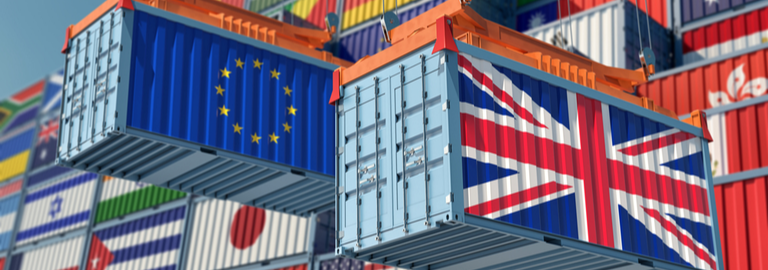Brexit tax burdens on UK exports cause SMEs to re-assess operating models
SMEs seek to implement dual fulfilment hubs or new warehouse facilities
SMEs seek to implement dual fulfilment hubs or new warehouse facilities

SMEs seeking to mitigate Brexit side-effects on exports could re-assess operating models to tackle the risk of a double tariff, with some establishing European hubs, according to market participants.
“What we’ll see in the longer-term, potentially starting quite soon, will be businesses reassessing their operating model in light of the new reality,” says Tom Rathborn, senior manager, Political and Economic Affairs at RSM.
“If you’re a UK distributor bringing products in from China into the UK and then back to Europe, that model isn’t as efficient as it was. You would be looking at setting something up in Europe. You could bring products directly from China into Europe and not have the double tariff issue.”
Following Brexit, UK businesses have been challenged by additional costs and admin due to the rule of origin and new VAT obligations.
To benefit from the exemption of tariffs on goods exported to the EU, businesses must prove the product originates from the UK. If the goods do not have a UK preferential origin, they will not be exported with EU preferential origin and could be charged an extra fee.
Exiting the EU single market also means goods exported from the UK are now subject to VAT obligations equal to third countries.
In January, UHY UK found that 20 percent of SMEs stopped exporting to the EU because of new custom rules.
“It has impacted some of the big players, but obviously they have bigger resources. For a lot of them, they would already have European operations and they would have been used to trading outside of Europe,” says Rathborn.
“It has been a massive change especially for e-commerce retailers. We’ve seen businesses switch off e-commerce for Europe as a short-term plan whilst they work out what their next steps will be”
To tackle these tax burdens, SMEs – particularly those with supply chains outside the EU – are now revising their operating models.
“As the dust settles over the new trading landscape, we are seeing businesses turn their attention to whether they may benefit from changing their business model in some way to adapt – this could entail changing Inco terms, adopting new customs procedures, changing logistics routes, or forming a new business,” said Amanda Tickel, Deloitte’s head of tax policy and Brexit lead, via email.
“In the consumer goods and retail space, this includes assessing whether to implement dual fulfilment hubs or add a new warehouse facility.”
One of the measures taken by UK SMEs includes establishing business hubs in the EU.
Dylan McCarthy, foreign associate at the Dutch law firm Blenheim, says a drastic amount of businesses have been looking at setting up entities in the Netherlands – known for being a gateway to the EU. Businesses can be exempt from VAT obligations by organising a Euro-hub.
“There are various workarounds to do it,” says McCarthy. “One of them is using a bonded warehouse in the Netherlands. It’s a tax and duty exempt warehouse where you can transport your goods and then distribute from there. For a lot of clients, it was necessary for them to set up Dutch entities or limited liability companies in the Netherlands and have some sort of distribution network in the Netherlands.”
By doing so, UK goods go straight to the Netherlands and then onto each of the EU countries they trade with. Using a bonded warehouse where goods are stored also enables them to avoid liability for tax and duties from where they can trade.
“So many businesses are looking to come to the Netherlands because they are already a lot of bonded warehouses and logistics companies set up there that are geared towards flying products to all corners of the EU,” adds McCarthy.
However, setting a new operation in the EU presents challenges.
Investment costs, travel difficulties between hubs and remaining VAT and rules of origin still need to be considered by businesses. Moving business activity also involves tax and legal implications such as transfer pricing (TP) and exit costs, according to Tickel.
Tickel believes the EU will remain a key market for the UK and continue to be an area of focus due to its proximity. But international trade agreements and exports could arise as compliance requirements for UK-EU exports become similar to international exports – presenting new opportunities for businesses.
On February 1, the UK government applied to join the Comprehensive and Progressive Agreement for Trans-Pacific Partnership (CPTPP) in a bid to facilitate its export of goods and services to these countries – which amounted to £58bn in 2019.
Whilst new trade deals could emerge, making efficiency gains in a post-Brexit landscape remains vital for businesses in 2021, according to Tickel.
“This will include managing compliance costs and processes for VAT and customs, including Rules of Origin, reengineering supply chains and logistics routes, tax and corporate structure changes, and managing changes to staff mobility,” she said.
Tickel encourages businesses to identify issues that do not require immediate remediation but may need to be monitored in the longer term.
“There is a phased implementation of many changes in the UK, including in areas like regulation, labelling and border controls which will need managing in 2021 and 2022, as well as taking into account new international trade agreements which could be beneficial,” she added.